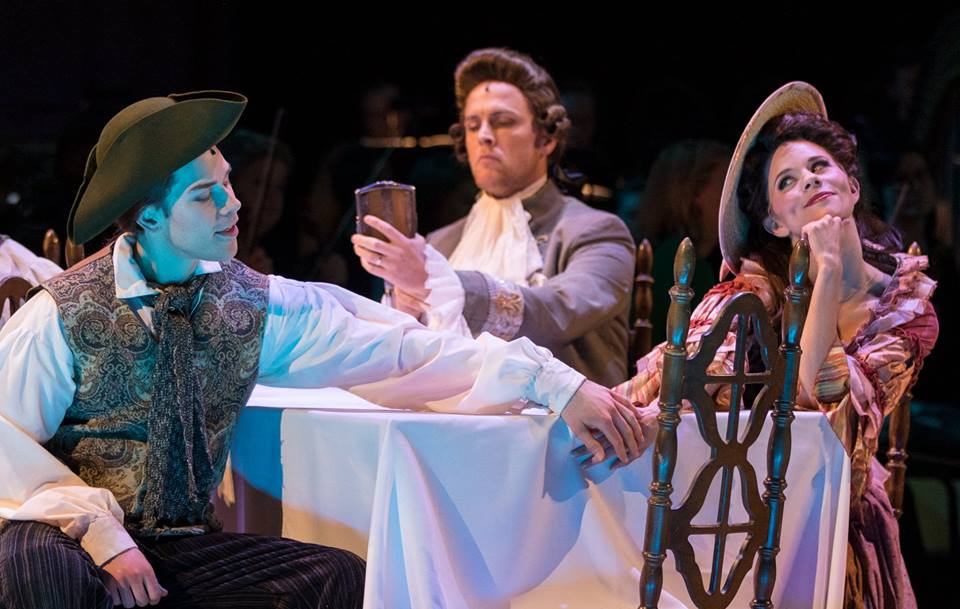SALT LAKE CITY — Candide is indeed a many splendid thing. Endlessly rewritten and unquestionably unwieldy, it’s essentially a comedic operetta, and in the hands of the Utah Opera and Utah Symphony, an incredibly accessible and entertaining one at that.
The plot is based on 18th century writer Voltaire who critiqued the unbridled optimism of his time by chronicling the misadventures of a young man Candide (played by Jonathan Johnson) and a cohort of other optimists who learn how the world really works.
Candide, originally performed on Broadway in 1956 and given a “final” update in 1989, is also zany in ways only a modern operetta can be. One of the running gags is that characters who die return in the next scene without explanation—like Kenny in South Park. Actors also frequently break the fourth wall, mug for the audience, and at one point (spoiler alert) symphony director Thierry Fischer’s baton is borrowed to stab a rival lover. It’s Gilbert and Sullivan mixed with Cleese and Idle. Wacky, wacky stuff indeed.
The show begins with the overture, which is one of the musical highlights. Despite being known as “Leonard Bernstein‘s Candide,” it is the only thing that really sounded, well, Bersteinian. The rest of the music (not orchestrated by Bernstein) is excellent, however, and wouldn’t be unfamiliar to anyone who’s seen The Pirates of Penzance.
Johnson was stunning as the handsome, young Candide. Relaxed and carefree, he swam freely in the madness around him with the voice of an angel. With a voice as powerful and clear as a bell, Johnson was a spectacular, natural leading man. Also in the mix was Hugh Russell as the eternally optimistic Dr. Pangloss and Victoria Livengood in a thick Russian accent as the Old Lady, whose malformed posterior got a tremendous amount of stage time. Tying things together was the Narrator (played by local talent Tobin Atkinson), who seemed like a competent and funny actor although he muffed several lines, which unfortunately stuck out among the other actors, who were all professional out-of-state hired guns.
At the end of the first act, I sat there thinking how accessible and crowd-pleasing this show it. Sure, there are supertitles, but they aren’t really needed. The lyrics are in English, the singers’ diction impeccable, and the jokes modern, fast and furious. Amy Owen as Cunegarde also slayed in the show’s best-known song, “Glitter and Be Gay.” In the number, Owen put on an operatic clinic, showcasing a dazzling array of vocal abilities. During the extended applause that resulted, the man next to me exclaimed, “That’s why I came! To see that right there!”
The minimalist set on the Abravanel stage in front of the symphony consisted of a table and chairs on one side, and an easy chair on the other from which the Narrator watched the action. A flag spread on the table indicated the country for each scene, although I’m confused why the chorus had Brazilian flags while the table had a Uruguayan flag for the Montevideo scene. The table was used for a leaky raft at one point, which was a nice touch.
The show was capably directed by Garnett Bruce and backed by the always professional and excellent Utah Symphony, whose director Thierry Fischer clearly enjoyed himself in several fourth-wall busting gags. The Utah Opera Chorus looked like they were having the time of their lives, and importantly, sounded great while doing it. In a particularly zany scene, the chorus participated in the Spanish Inquisition like they were a crowd at a football game, cheering and waving flags for their favorite “teams.”
If only the second act was as enjoyable as the first. Once the action moved to South America, the laughs dried up, and the repetitive plot became repetitive. Candide travels to a new location, gets reunited with his friends, and tries to win Cunegarde’s hand while she has a dizzying amount of sexual escapades with everyone but him. (The same thing happens in every chapter of Don Quixote: Quixote rides somewhere, gets into a fight, loses in embarrassing fashion, and moves on to the next town.)
While it’s funny that people come back to life for no reason (the song title “You Were Dead, You Know” is hilarious by itself), it also made it hard to care for the characters. And, unfortunately, the show is bookended by a moralistic lesson that the rest doesn’t flesh out. It’s not the best-timed message either. While life is indeed a rich tapestry of happiness and sadness and naivety should be overcome as the show argues, 2018 is so cynical that the anti-optimism message is poorly timed. The world would be a better place if more adopted Dr. Pangloss’ ability to look on the sunny side of everything instead of the Narrator’s smug cynicism that will be familiar to anyone who’s read an internet comments section. In the words of President Obama, “Cynicism is so easy, and cynics don’t accomplish much.”
But the bulk of the show is concerned less about philosophy than finding humor in history, sex and violence. And fair warning that while the show is well within “PG-13” territory, the subject of rape is employed more than once with comic intensions. Broad ethnic stereotypes are also used freely, and I was surprised Utah Opera didn’t temper the Jewish characterizations some more.
While the second act’s limitations prevent Candide from reaching greater heights, the abundant humor and transcendent musical moments in the first warrant a strong recommendation. When all is said and done, Candide truly is a strange beast of a show. But it’s also a fault of human nature to want to categorize everything (whether it’s works of art or other people), so I celebrate the fact that Candide can’t be easily categorized.
[box]Utah Opera and Utah Symphony’s production of Candide was held in Abravenel Hall (123 West South Temple, Salt Lake City) on November 9 and 10. To learn more about future productions, visit usuo.org.[/box]
